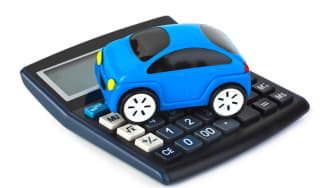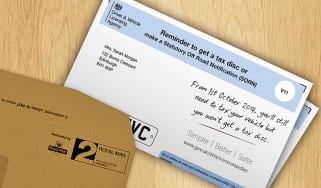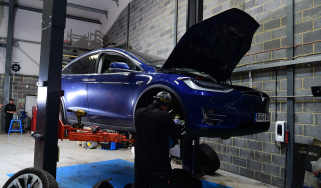Tax Checker
Enter a registration number below to check if the vehicle has VED road tax or when its tax runs out. We’ll show you its MOT history as well.
How to check your car tax status
Input a registration number
Our tax checker tool allows you to see whether a vehicle in England, Scotland or Wales is taxed
Get the tax details
The tool shows if the car is taxed and when the tax is due for renewal
Discover more...
The tool also gives details of the car’s make, model, colour, MoT history, MoT advisories and its SORN status.
How to tax your car
The easiest way to actually tax your vehicle is using the government’s gov.uk online portal.
You can also pay car tax by phone using the DVLA’s 24-hour vehicle tax service, on 0300 123 4321, or visiting your local Post Office and pay by cash or card.
If you already own the car, you should receive the DVLA’s V11 tax reminder letter. This includes a reference number you can use when applying to tax your car.
If you’ve just bought a car, all the necessary information to tax it in your name will be on the new keeper slip from the V5C registration document.
If you pay your car tax by Direct Debit, then you may not need to do anything at all. The Direct Debit should automatically renew it, and you’ll be sent a letter or email confirming when the payments will be taken.
In order to tax your car, it also needs a valid MoT, unless the vehicle has been registered as historic and is exempt from MoT tests.
How much does car tax cost in the UK?
Car tax costs can depend on what you drive, how old it is, what fuel it burns (if any), and, if it’s a newer vehicle, how much it cost to buy.
The cheapest vehicles to tax are those over 40 years old and registered as historic, and zero-emission vehicles – mostly battery electric cars – which have until now been free to tax but from April 2025 attract a fee of £10 in their first year, and a standard rate of £195 per year thereafter. This annual rate will also apply to EVs registered after 1 April 2017, though if you own a zero-emission vehicle registered between 1 March 2001 and 30 March 2017, you’re in luck, as you’ll pay just £20 per year.
For all other vehicles registered since 2017, tax is tiered based on CO2 emissions. First-year tax rates have gone up quite a lot in recent years: from April 2025, anything producing between a single gram and 50g/km of CO2 gets a £110 bill, and this rises to a massive £5,490 per year for cars emitting more than 255g/km.
From the second year onwards, everything gets a flat rate: £190 per year for petrol and diesel vehicles, and £180 for ‘alternative fuel’ vehicles, including hybrids and plug-in hybrids. However, if your car cost more than £40,000 to buy brand new, it’s liable for an additional £410 per year for the following five years, lifting your tax bill to £600 for petrol/diesel and £590 for alternative fuel. EVs are also now subject to the £40,000-and-over surcharge, so taxing a Lamborghini actually seems better value in year two than taxing a well-specced electric family car…
As for older vehicles, cars registered between March 2000 and April 2017 also have a CO2-based tiered system, costing just £20 a year for sub-100g/km vehicles, rising to more than £700 per year for those over 255g/km.
Prior to 1 March 2000, all vehicles are taxed based on engine capacity. If your car is under 1549cc, it’s £210 per year. If it’s over 1549cc, £345 per year. Not cheap, but fairly simple to understand at least.
What happens if you don’t tax your vehicle?
It’s bad news, basically. Driving an untaxed car, just like an uninsured one or a car without a valid MOT, is illegal. If you simply don’t tax or SORN your vehicle, then even if it’s just parked up, you’re liable for an £80 fine, or £40 if you pay it within 33 days.
The fines only go up from there. Drive your untaxed vehicle around and you’ll be sent an out of court settlement order for £30, plus one and a half times the outstanding vehicle tax – inconvenient but not a real wallet-buster if you own a car that only costs £20 a year to tax, but pretty painful if you’ve got an old Range Rover or similar with a VED bill of over £700. Fail to pay this and the penalty is either £1,000, or five times the amount of tax chargeable, whichever is greater.
SORN your vehicle and then drive it around, and the penalties are even steeper – a £30 out of court settlement plus twice the outstanding vehicle tax. Fail to pay this too, and you’re looking at £2,500 or five times the amount chargeable, whichever is greater. In either case, expect your vehicle to be clamped until you’ve paid too, with further charges for removal.
So just like insurance and MoT, you’re considerably better off stumping up than trying to avoid it.
Are there any vehicles that don’t need car tax?
Fewer than there used to be. Electric cars previously had zero-rate VED, which meant that while you still needed to actually ‘tax’ them, by going through the motions on the government website, you didn’t actually pay for the privilege. From April 2025 that changes and you’ll pay £10 when you buy the car, and a heftier £190 per year thereafter – plus any expensive vehicle surcharge that’s due.
With EVs out of the mix, there are still several other categories of vehicle exempt from VED. The first is those used by a disabled person, and exemption can be applied for when going through the tax process. It only applies to one vehicle in the household though, and exemption must be removed if the vehicle is no longer being used by a disabled person.
Mobility vehicles and powered wheelchairs are similarly exempt (if they do no more than 8mph on roads or 4mph on pavements), mowing machines, steam vehicles (so good news if you own an enormous Victorian traction engine), and agriculture and forestry vehicles, such as tractors.
The best-publicised exemption though is for ‘historic’ vehicles, loosely defined as those more than 40 years old – though functionally, 41 years old, since exemption begins on April 1 for vehicles registered during the entirety of the preceding year: so in April 2025, only vehicles made before January 1, 1985 become exempt, not any vehicle made during 1985. If you register your vehicle as historic, it also makes it exempt from MoT testing.
And of course, if you apply for Statutory Off Road Notification, or SORN, then you don’t have to pay any tax on the vehicle during that period – but you’ll need to tax it again before putting it back on the road. The DVLA’s full exemption list can be found here.
Frequently Asked Questions
No, you’ll need to apply for a replacement V5C logbook (£25 fee) or use the green new keeper slip that you get when buying a car.
Find a car with the experts







